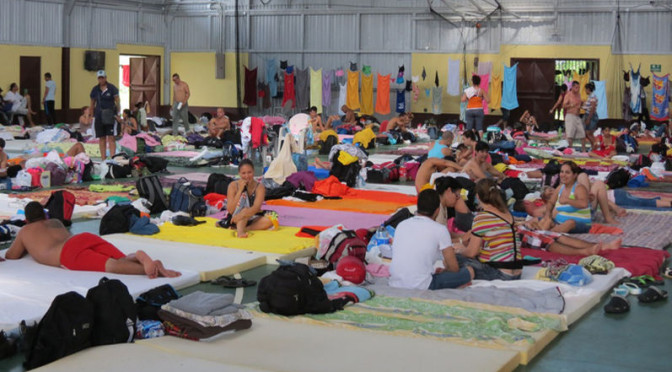
Cubans in Central America: A crisis imposed by the U.S.
An editorial from La Jornada
The Mexican Foreign Ministry announced [on Wednesday] (Dec. 28) an accord reached by Belize, Costa Rica, El Salvador, Guatemala, Honduras, Panama and Mexico to carry out a pilot test in January for the purpose of taking to Mexico some of the Cubans who wish to travel to the United States and find themselves adrift in Costa Rica after the Nicaraguan authorities shut their borders to those migrants.
Costa Rican Foreign Minister Manuel González said that the test will be to fly the migrants from Costa Rica to El Salvador — with tickets paid by themselves — and from there bus them through Guatemala and Mexico to the U.S. border. If everything works out, the solution will be applied to the 5,000 to 7,000 Cubans now in Costa Rican territory.
Minister González said, however, that the measure is of an absolutely exceptional nature and will apply only to the Cubans who are already in Costa Rica, not to those who may attempt in the future to travel through that country, which recently stopped issuing transit visas to Cuban citizens.
The measure announced [on Monday] is undoubtedly positive and humanitarian but altogether insufficient, not only because of its exceptionality but also because it leaves intact some fundamental problems that need to be corrected.
The attempts by Cubans to reach the United States have increased as a result of the process of normalization of relations between Washington and Havana, due to the fear of some Cubans that normalization may lead to the suppression of the conditions of privilege enjoyed by Cuban citizens to obtain residence in the U.S.
But that prebend does not apply to those who travel from the island to the United States under regular conditions, but only to those who manage to reach U.S. soil by sea or through third countries, which has encouraged illegal migration for several decades.
Besides, it has been a discriminatory and infamous double standard. Unlike the rest of Latin Americans, Cubans need only to show up at a U.S. border station and declare their nationality in order to enter the country.
With such background, it is at first sight inexplicable that governments like those of Costa Rica, Nicaragua, Guatemala and Mexico have blocked that migratory flow that does not have those countries as a final destination.
The sensible, humane and correct thing to do would be to permit that those Cubans traverse the territories of those nations on their way to the United States.
The only reason that allows us to understand the intolerance of the aforementioned governments is the pressure from Washington to keep the Cubans from reaching U.S. territory, a pressure exerted furtively because the White House, while deeming undesirable the arrival of thousands of Cubans in its territory, cannot openly contradict its own existing policies of encouragement for Cuban migrants.
Solid data allow us to affirm that Mexico and Guatemala have been turned by Washington into a sort of forward migration checkpoints, for the purpose of hindering the transit of Central and South Americans to the United States.
Everything indicates that that strategy — which represents both unjustifiable meddling and submissiveness — is now being applied to bar passage to Cuban migrants.
However, for the governments involved, there is no legitimate reason to persist in the application of migratory restrictions. It is a humane obligation to allow the Cubans free transit to the neighboring country up north.
If the authorities in Washington are now trapped between their anti-Cuban legislation — which always tried to present the island as a hell that its inhabitants wished to leave at all cost — and their fear of a massive arrival of Cubans, it is their duty to find a solution, and it is demandable that they cease to dump the problems in this matter onto other nations.
(From the Mexican newspaper La Jornada.Translation by Progreso Weekly.)

